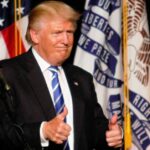


In a significant move, President Donald Trump has taken steps to revoke the security clearance of his predecessor, Joe Biden, effectively terminating Biden's access to the nation's daily intelligence briefings.
The BBC reported that the decision draws on previous tensions between the current president and Biden, who removed Trump's access to similar sensitive information in 2021.
The origins of this decision can be traced back to Biden's early presidency. At that time, Biden barred Trump from receiving intelligence briefings, citing concerns about Trump's unpredictable behavior.
This set the stage for the current conflict, which involves questions of national security and the allocation of sensitive information post-presidency. Biden's precedent has now come full circle as Trump utilizes the same rationale.
Trump has not limited his actions solely to Biden. His administration has made sweeping moves to revoke clearances for over fifty former intelligence officials.
According to Trump, these individuals were involved in influencing the 2020 presidential election outcomes, acting in favor of Biden's campaign. The repercussions of these decisions are still unfolding across various spheres of government and media.
In a social media post, President Trump elaborated on his decision, stating there was no necessity for Biden to remain privy to current classified information.
These sentiments underscore the broader conflict simmering between the two leaders over their roles and responsibilities once out of office. Trump's choice follows his opinion that continued access for Biden serves no purpose.
Beyond individual revocations, Trump has targeted a broader circle of former officials associated with the Biden administration. Security clearances for key figures such as Mark Milley, Anthony Fauci, Mike Pompeo, and John Bolton have also been rescinded.
This action fits within Trump’s broader assertion that security protections and clearances are typically removed following the conclusion of government service.
In a related development, Pete Hegseth, the new Defense Secretary, has been tasked with investigating Mark Milley's activities. This investigation reflects the ongoing scrutiny of military and intelligence officials who served under Biden, shining a spotlight on their past actions and current status.
An investigation into Biden's own handling of classified materials determined that no criminal indictments were necessary but did question Biden's memory regarding these matters.
Biden has contested the inquiry's findings, rejecting the depiction of memory lapses as part of his overall handling of sensitive information. These elements are central to understanding the dynamics between Trump and Biden, as both attempt to shape their ongoing legacies.
Additionally, Trump referenced a group of former CIA directors whose clearances were nullified after they signed a letter that described reports concerning Hunter Biden's laptop as a Russian ploy. The laptop later emerged as a legitimate source of incriminating content, complicating the narratives surrounding past intelligence conclusions.
In aligning his latest actions with prior presidential decisions, Trump uses political theater to portray his rationale. He linked the move with his television persona from his time on "The Apprentice," using the iconic phrase to underscore his point. This choice in language may resonate with his supporters but also highlights the polarizing nature of his tenure.
Biden's own words a few years earlier questioned the benefit of briefing Trump, as he pointed to Trump's overall impact post-presidency.
This narrative has been replayed in many forms through the media, framing both leaders as unable to fully disengage from their previous roles.
The unfolding situation between Trump and Biden shines a light on a peculiar aspect of presidential transitions and the benefits traditionally extended to former presidents.
This ongoing saga prompts questions regarding policy consistency, respect for conventions, and the need for reevaluated protocols when past and present executive figures hold diverging perspectives on national security.



